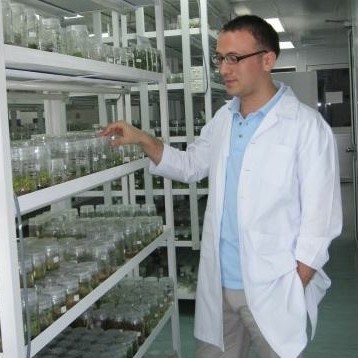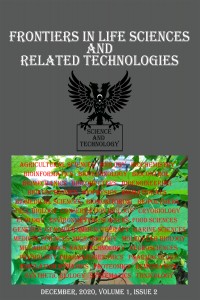Research Article
Issue Editorial Board

Biological Sciences, Plant Morphology and Anatomy, Ecology (Other)

Biological Sciences, Plant Biotechnology, Industrial Biotechnology, Rural and Regional Geography, Agricultural, Veterinary and Food Sciences, Non-Genetically Modified Uses of Biotechnology, Genetically Modified Trees

Plant Cell and Molecular Biology, Genomics and Transcriptomics, Mycology, Phytopathology

Proteomics and Intermolecular Interactions, Synthetic Biology

Enzymes

Dr. Naser A. Anjum was awarded Ph.D. (Botany) degree by Hamdard University (Jamia Hamdard), New Delhi (India), and received post-doctoral research trainings at University of Aveiro (Portugal), Agricultural Biotechnology Research Centre, Academia Sinica (Taiwan) and Aligarh Muslim University, Aligarh (India).
Dr. Anjum has made significant contributions to the biology of 'Plant/Crop-Environment Adaptation'. His works have enlightened the physiology and biochemistry of plants/crops, and their adaptation/tolerance to varied abiotic stress factors and emerging pollutants. Employing a whole-plant genotype/organ-based approach incorporating stress-sensitive biomarkers responses during plant ontogeny (development), earlier works of Dr. Anjum have deciphered cellular redox managers such as ascorbate (AsA), glutathione (GSH) and their redox-couples (AsA/DHA, GSH/GSSG), and associated enzymes in AsA-GSH pathway as the major targets of abiotic stresses (metals/metalloids; nanoparticles, NP; drought/salinity). Research works of Dr. Anjum have evidenced that maintaining a proper mineral-nutrient or hormonal-status of plants can modulate the cellular status of redox compounds (AsA, GSH) that in turn can improve plant resistance to varied environmental stress-factors. Additionally, his research also revealed two types of sulfate-transporter systems and their role in sulfur-efficiency in Indian mustard and studied industrial effluents-accrued cytotoxicity in plants.Dr. Anjum has been a pioneer worker to unveil: nano-graphene mediated oxidative stress, antioxidant metabolism and GSH-redox system significance in food crop model, and vital biochemical/physiological and chemical strategies adopted by plant species for their sustenance under environmental metal/pollutants exposure. Dr. Anjum is currently involved in the development of biosensors for the real-time monitoring of major reactive oxygen species in plants.
Dr. Anjum has received prestigious research grants from Portuguese Foundation for Science and Technology (FCT) (Portugal), Academia Sinica (Taiwan), Council of Scientific and Industrial Research (CSIR), and Department of Biotechnology (DBT), New Delhi. He has published > 85 peer-reviewed articles with a cumulative impact factor of >200 and ≈3000 citations; edited 15 books and journal special issues; and also availed 03 research grants/projects financed by FCT (Portugal), and CSIR, and DBT (New Delhi, India). Dr. Anjum has h-index of 31 (SCOPUS) (https://www.scopus.com/authid/detail.uri?authorId=23097123400).
Dr. Anjum has been honored with several awards including the NESA-Eminent Scientist of the Year Award (2018) by the National Environmental Science Academy (NESA), New Delhi; Bharat Vikas Award (2018), Institute of Self Reliance, Bhubaneshwar, Odisha; Outstanding Scientist Award (2018) International Organization of Scientific Research and Development (IOSRD), Chennai, Tamil Nadu; and Scientist of the Year Award (2017) by the National Environmental Science Academy (NESA), New Delhi. In addition, Dr. Anjum is a Fellow of Plantae, American Society of Plant Biologists (ASPB), USA; Scholars Academic and Scientific Society (SASS), Hojai, Assam; Society for Plant Research (SPR), Meerut; and the National Academy of Biological Sciences (NABS), Chennai.
Dr. Anjum is the Managing Editor of Plant Growth Regulation (ISSN: 0167-6903; 2015 - to date); Assistant Editor of Brazilian Journal of Botany (ISSN: 0100-8404; 2015 - to date); Associate Editor of journals Acta Physiologiae Plantarum (e ISSN: 1861-1664; 2015-2017), International Journal of Plant Biology (eISSN 2037-0164; 2014 - to date), Phyton - International Journal of Experimental Botany (ISSN:0031-9457; 2018 - to date) and Frontiers in Marine Science, section - Marine Pollution (eISSN: 2296-7745; 2015 - to date).
Plant Physiology, Nanotechnology
Frontiers in Life Sciences and Related Technologies is licensed under a Creative Commons Attribution 4.0 International License.







